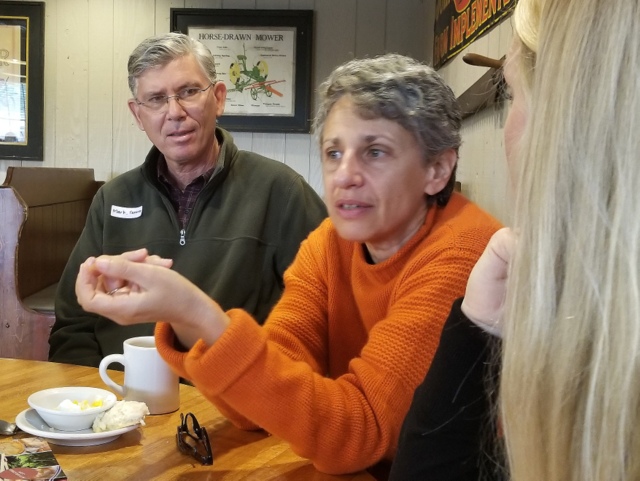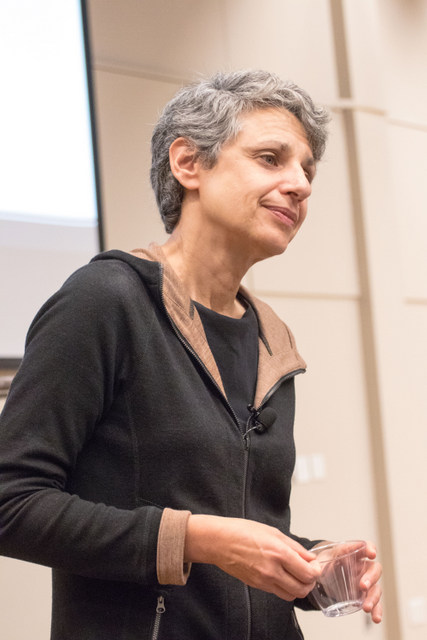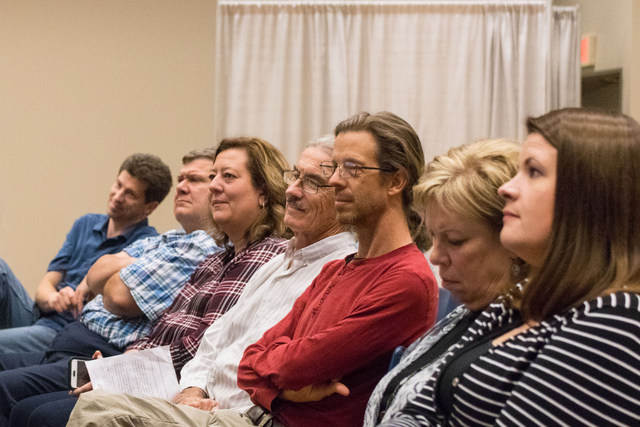
6 Steps for More Effective and Less Confrontational Conversations!
When was the last time you changed your mind? Not about something fairly inconsequential, like what to eat for supper tonight, but about a pivotal issue where you took a stand but later changed your mind?
Probably not lately. Maybe never.
It was an intriguing question posed by fellow writer Tamar Haspel–a question that still has me pondering its ramifications a few weeks after Haspel’s visit to Iowa.
“Many people go into conversations about food and agriculture with the expectations of changing others’ minds,” said Tamar Haspel, a Washington Post columnist who accepted the Iowa Food and Family Project’s invitation to tour Iowa farms in late September and learn more about Midwest agriculture. “We need to stop talking past each other.”

Tamar Haspel provided plenty of food for thought during her lecture about Iowa food and farming–and how to have more productive conversations about these topics–during a late September presentation at Drake University in Des Moines.
Yes, we need to stop talking past each other, I thought after Haspel uttered these sentiments during a breakfast meeting at the Iowa Machine Shed. It appeared that a lot of of the other ag leaders around the table with me were thinking the same thing.
If we believe we need to stop talking past each other, we need to understand more about how humans make decisions. Scottish philosopher and historian David Hume figured it out more than 200 years ago, Haspel noted, when he stated that reason is merely the “slave to the passions.”
“Why are we so bad at evaluating evidence?” asked Haspel, who is a Cape Cod oyster farmer and award-winning journalist who covers food supply issues, including biotech, pesticides, antibiotics, organics, nutrition and food policy.
Blame the confirmation bias, the human tendency to search for, interpret, favor and recall information that confirms one’s preexisting beliefs.
“Think about where the presets are on your car or truck radio,” said Haspel, who spoke at Drake University to approximately 50 people, including myself, on Sept. 27 during a public forum hosted by the Iowa Food and Family Project. “Think of the news sources you turn to and the people you follow on social media. All of us tend to live in our silo surrounded by people who think like us.”
How does all this play out with food and agriculture? Consider the facts. Farmers are mostly rural (no surprise) and Republican, based on campaign contributions reported to the Federal Election Commission. Activists and journalist are almost the exact opposite in these areas, Haspel said.
“This means farmers, activists and journalists are coming at food and agriculture issues with two completely different sets of values,” Haspel added.
6 steps for more effective conversations
This also means facts alone often aren’t persuasive. “So how do we communicate about food and farming? There are no good answers,” Haspel acknowledged.
Still, she offered six key steps to foster better communication, especially regarding food and agriculture topics:
1. Be persuaded that dynamics like the confirmation bias are real. While people often feel like they are rational human beings, everyone is susceptible to less-than-rational thinking. It’s time to re-evaluate the nature of certainty. “Are you right about everything?” Haspel asked the audience, who chuckled at the question. “So what aren’t you right about? It’s very difficult for us to spot where we go wrong, yet it’s easy to spot where others go wrong.” Two key questions keep Haspel awake at night as she strives to address her confirmation biases. “What do I get wrong? What am I not seeing? When you ask these questions, you go out into the world a little more circumspect,” she said.
2. Reconsider bias. Not only does everyone have biases, but bias is a necessary part of the human condition, Haspel said. “Expecting people to be objective is unfair.”
3. Drop “anti-science” from your vocabulary. “There’s science to say anything,” Haspel said. “When this plays out in the GMO debate, saying, ‘You’re anti-science’ translates as ‘you’re an idiot and I’m not.’”
4. Vet your sources. Assess the credibility of news sources, and seek various points of view. “I try to make sure my Twitter feed has lots of people I don’t agree with, along with people I agree with,” Haspel said.
5. Acknowledge truth on both sides. During her tour of Iowa farms, Haspel observed how many farmers feel beleaguered and lead with their defense. She also understands where this mindset comes from, as some audience members at Drake quizzed her about whether large-scale farming changes farmers’ motivations and turns agriculture into a profit-driven operation only. Other audience members questioned farmers’ commitment to protecting water quality and stressed the need for more regulation. “I talked with Iowa farmers who are definitely stewards of the land,” Haspel said. “But are there farmers who aren’t doing it right? Yes, there’s a minority for whom these criticisms apply. Since there is justice in some of the criticism, maybe that can help us find some common ground.”
6. Find intelligent people who disagree with you, and listen. “It’s so easy for us to talk to people who agree with us,” Haspel said. “I try to find the smartest person I know who doesn’t agree with me, and I listen carefully.”

Audience members at Drake University in Des Moines, including Iowa Turkey Federation Executive Director Gretta Irwin (third from left) pondered Tamar Hapels’ 6 tips on more effective conversations involving food and ag topics.
Opening minds, acknowledging truth
I was fascinated by what I was hearing. I also wanted to talk this through with a colleague who attended Haspel’s lecture. I reached out to Gretta Irwin, a home economist and executive director of the Iowa Turkey Federation.
“Tamar opened our minds by helping us understand how we form opinions,” Irwin told me. “She also provided great examples of how we need to be open to thinking about questions, acknowledging truths on both sides, admitting where improvements can be made and learning more about the perspective of the opposing view.”
When questioned about modern agriculture, Haspel did a great job presenting both perspectives of the issue, Irwin added. “She clearly showed there’s no simple solution to issues facing agriculture.”
I also checked in with Sean McMahon, executive director of the Iowa Agriculture Water Alliance.
“Tamar’s comments that we can all be more introspective and work to better understand the other side’s perspectives resonated with me. Welcoming constructive dialogue, in the spirit of continuous improvement, can help further efforts.”
He also liked Haspel’s emphasis on storytelling, as did I. “Tamar’s advice that we should seek to influence through storytelling rather than through facts, figures, and science also struck a chord with me. By putting a human face on efforts and progress, we can reach more people with our story.”
Haspel encourages people to visit farms, have face-to-face conversations with farmers, try to see the benefits of all kinds of agriculture and find common ground, when possible. “If we can do nothing else, we can be kind,” Haspel said. “The common commitment to feeding people can also get us past the rhetoric.”
Want more?
Thanks for stopping by. I invite you to read more of my blog posts if you want more more intriguing Iowa stories and history, along with Iowa food, recipes and tips to make you a better communicator.
If you like what you see and want to be notified when I post new stories, be sure to click on the “subscribe to blog updates/newsletter” button at the top of this page. Feel free to share this information with friends and colleagues who might be interested, too.
If you’re hungry for more stories of Iowa history, check out my top-selling “Culinary History of Iowa: Sweet Corn, Pork Tenderloins, Maid-Rites and More” book from The History Press. Also take a look at my latest book, “Dallas County,” and my Calhoun County” book from Arcadia Publishing. Both are filled with vintage photos and compelling stories that showcase he history of small-town and rural Iowa. Order your signed copies today! Iowa postcards are available in my online store, too.
Let’s stay in touch. I’m at darcy@darcymaulsby.com, and yettergirl@yahoo.com.
Thanks,
Darcy
P.S. Thanks for joining me. I’m glad you’re here.
@Copyright 2017 Darcy Maulsby & Co.
Recent Posts
- Do Press Releases Still Work?
- Erasing History? Budget Cuts Threaten to Gut Ag History at Iowa State University
- Machines that Changed America: John Froelich Invents the First Tractor in Iowa
- Bob Feller on Farming, Baseball and Military Service
- Classic Restaurants of Des Moines: A Taste of Thailand Served the "Publics" and Politics
- Want to Combat Fake News? Become a Better Researcher
Categories
- Achitecture
- Agriculture
- Architecture
- baking
- barbeque
- Barn
- breakfast
- Business
- Communication Tips
- Conservation
- content
- cooking
- Crime
- Dallas County
- Economical
- Farm
- Featured
- Food
- Food history
- health
- Iowa
- Iowa food
- Iowa history
- marketing
- Photography
- Recipes
- Seasonal
- Small town
- Storytelling
- Uncategorized
- writing
Archive by year
- 2023
- 2022
- 2021
- 2020
- When Agriculture Entered the Long Depression in the Early 1920s
- The Corn Lady: Jessie Field Shambaugh and the Birth of 4-H in Iowa
- Sauce to Sanitizer: Cookies Food Products Bottles Hand Sanitizer Made with Ethanol
- Myth Busting: No, Your Pork Doesn't Come from China
- Long Live Print Newsletters! 5 Keys to Content Marketing Success
- Shattering Silence: Farmer Helped Slave Find Freedom and Racial Equality in Iowa
- Meet Iowa Farmer James Jordan, Underground Railroad Conductor
- George Washington Carver Rose from Slavery to Ag Scientist
- Remembering the African-American Sioux City Ghosts Fast-Pitch Softball Team
- Want to Combat Fake News? Become a Better Researcher
- Classic Restaurants of Des Moines: A Taste of Thailand Served the "Publics" and Politics
- 2019
- The Untold Story of Iowa’s Ag Drainage Systems
- Stop Rumors Before They Ruin Your Brand
- Finding Your Voice: The Story You Never Knew About "I Have a Dream"
- Warm Up with Homemade Macaroni and Cheese Soup
- Can a True Story Well Told Turn You into a Tom Brady Fan?
- Baking is for Sharing: Best Bread, Grandma Ruby’s Cookies and Other Iowa Favorites
- 4 Key Lessons from Bud Light’s Super Bowl Corn-troversy
- Could Your Story Change Someone’s Life?
- What To Do When the Travel Channel Calls
- Tex-Mex Sloppy Joes and the Magic of Maid-Rite in Iowa
- How Not to Invite Someone to Your Next Event--and 3 Solutions
- We Need FFA: Iowa Ag Secretary Mike Naig Reflects on His FFA Experiences
- From My Kitchen to Yours: Comfort Food, Conversation and Living History Farms
- Smart Marketing Lessons from an Uber Driver--Listen Up!
- Hog Trailers to Humidors: Two New Iowa Convenience Stores Reflect “Waspy’s Way”
- A Dirty Tip to Make Your Social Media Content More Shareable
- Are You on Team Cinnamon Roll?
- Senator Grassley on Farming: Any Society is Only Nine Meals Away From a Revolution
- Why We Should Never Stop Asking Why
- What’s the Scoop? Expanded Wells’ Ice Cream Parlor Offers a Taste of Iowa
- Independence, Iowa’s Connection to the Titanic and Carpathia
- Memories of Carroll County, Iowa, Century Farm Endure
- Iowa's “Peacemaker Pig” Floyd of Rosedale Helped Calm Racial Tensions
- 2018
- How to Cook a Perfect Prime Rib
- How Did We Get So Rude?
- Mmm, Mmm Good: Soup’s on at the Rockwell City Fire Department
- Quit Using “Stupid Language”
- In Praise of Ham and Bean Soup
- Recalling a Most Unconventional—and Life-Changing--FFA Journey
- Events Spark Stories That Help Backcountry Winery Grow in Iowa
- Sac County Barn Quilt Attracts National Attention
- Doing Good, Eating Good at Lytton Town Night
- Young Entrepreneur Grows a Healthy Business in Small-Town Iowa
- Digging Deeper: Volunteers Showcase Thomas Jefferson Gardens in Iowa
- How to Tell Your Community’s Story—with Style!
- DNA Helps Sailor Killed at Pearl Harbor Return to His Family
- It’s Time to Be 20 Again: Take a Road Trip on Historic Highway 20
- The Biggest Reason You Shouldn’t Slash Your Marketing Budget in Tough Times
- Are You Telling a Horror Story of Your Business?
- Pieced Together: Barn Quilt Documentary Features Iowa Stories
- Unwrapping Storytelling Tips from the Candy Bomber
- Barn Helped Inspire Master Craftsman to Create Dobson Pipe Organ Builders
- Butter Sculptures to Christmas Ornaments: Waterloo Boy Tractor Celebrates 100 Years
- Ag-Vocating Worldwide: Top 10 Tips for Sharing Ag’s Story with Consumers
- 2017
- Growing with Grow: Iowa 4-H Leader Guides 100-Year-Old 4-H Club for 50 Years
- High-Octane Achiever: Ethanol Fuels New Driver Tiffany Poen
- Shakespeare Club Maintains 123 Years of Good Taste in Small-Town Iowa
- Iowa’s Ice Queen: Entrepreneur Caroline Fischer’s Legacy Endures at Hotel Julien Dubuque
- Darcy's Bill of Assertive Rights: How to Communicate and Get What You Need
- Celebrating Pi Day in Iowa with Old-Fashioned Chicken Pot Pie
- Cooking with Iowa’s Radio Homemakers
- Top 10 Tips to Find the Right Writer to Tell Your Company’s Stories
- The “No BS” Way to Protect Yourself from Rude, Obnoxious People
- Learning from the Land: 9 Surprising Ways Farmers Make Conservation a Priority
- Leftover Ham? Make This Amazing Crustless Spinach and Ham Quiche
- Iowa’s Lost History from the Titanic
- Coming Soon--"Dallas County," a New Iowa History Book!
- How to Clean a Burned Pan in 6 Simple Steps
- Iowa Beef Booster: Larry Irwin Takes a New Twist on Burgers
- Get Your Grill On: How to Build a Better Burger
- "Thank God It’s Over:" Iowa Veteran Recalls the Final Days of World War 2
- How to Thank Veterans for Their Military Service
- Imagine That! Writers, Put Your Reader Right in the Action
- Remembering Ambassador Branstad’s Legacy from the 1980s Farm Crisis in Iowa
- Busting the Iowa Butter Gang
- Lightner on Leadership: “Everyone Has Something to Give”
- Show Up, Speak Up, Don’t Give Up
- Small - Town Iowa Polo Teams Thrilled Depression - Era Crowd
- Ethanol:Passion by the Gallon
- Cruising Through Forgotten Iowa History on Lincoln Highway
- Why I'm Using a Powerful 500-Year-Old Technology to Make History--And You Can, Too
- 5 Ways a “History Head” Mindset Helps You Think Big
- Behind the Scene at Iowa's Own Market to Market
- Let’s Have an Iowa Potluck with a Side of History!
- Iconic State Fair Architecture: Historic Buildings Reflect Decades of Memories
- Iconic State Fair Architecture- Historic Buildings Reflect Decades of Memories
- Iowa Underground - How Coal Mining Fueled Dallas County's Growth
- Ultra-Local Eating: Jennifer Miller Guides CSA, Iowa Food Cooperative
- The Hotel Pattee and I are Hosting a Party—And You’re Invited!
- Tell Your Story—But How?
- Mediterranean Delights: Iowa Ag Influences Syrian-Lebanese Church Dinner
- 6 Steps for More Effective and Less Confrontational Conversations
- 6 Steps for More Effective and Less Confrontational Conversations!
- 6 Ways to Motivate Yourself to Write—Even When You’re Not in the Mood
- Always Alert-How to Stay Safe in Any Situation
- Does Accuracy Even Matter Anymore?
- Soy Power Shines at Historic Rainbow Bridge
- Free Gifts! (Let’s Talk Listening, Stories and History)
- 2016
- How to Connect with Anyone: Lessons from a Tornado
- Soul Food: Lenten Luncheons Carry on 45-Year Iowa Tradition
- Top 3 Tips for Writing a Must-Read Article
- Darcy's Top 10 Tips to Better Writing
- Top 8 Tips for Building a Successful Freelance Business
- 10 Steps to Better Photos
- Reinventing the Marketer of 2010
- Extreme Writing Makeover
- My Top Social Media Tips for Farmers: REVEALED!
- Honoring the Legacy of Rural Iowa's Greatest Generation
- Iowa's Orphan Train Heritage
- Dedham’s Famous Bologna Turns 100: Kitt Family Offers a Taste of Iowa History
- Iowa Barn Honors Pioneer Stock Farm
- Darcy's Top 10 Tips for Better Photos
- Soup and Small-Town Iowa Spirit
- Savoring the Memories: Van's Café Served Up Comfort Food for Six Decades
- Mayday, Mayday—The Lost History of May Poles and May Baskets in Iowa
- Iowa's Vigilante Crime Fighters of the 1920s and 1930s
- Very Veggie: Iowan's Farm-Fresh Recipes Offer Guilt-Free Eating
- Iowa Public TV's "Market to Market" Features Expedition Yetter, Agri-Tourism, Des Moines Water Works' Lawsuit
- 62 Years and Counting: Calhoun County, Iowa, Families Maintain 4th of July Picnic Tradition
- “A Culinary History of Iowa” Satisfies: Iowa History Journal Book Review
- For the Love of Baking: Lake City's Ellis Family Showcases Favorite Iowa Farm Recipes (Caramel Rolls, Pumpkin Bars and More!)
- Remembering Sept. 11: Iowa Community’s Potluck Honors America
- Talking Iowa Food and Culinary History on Iowa Public Radio
- Talking "Stilettos in the Cornfield," Taxes, Trade and More on CNBC
- FarmHer #RootedinAg Spotlight--FFA Attracts More Women to Careers in Ag
- Rustic Cooking Refined: Iowan Robin Qualy Embraces Global Flavors
- Voice of Reason: Iowa Pork Producer Dave Struthers Offers Top 10 Tips to Speak Up for Ag
- Iowa Eats! Why Radio Iowa, Newspapers and Libraries are Hungry for "A Culinary History of Iowa"
- Iowa Turkeys Carry on National Thanksgiving Tradition
- Riding with Harry: 2016 Presidential Election Reflects Truman's Iowa Revival at 1948 Plowing Match in Dexter
- All Aboard! Rockwell City’s “Depot People” Offer a Taste of Iowa History
- Is This Iowa's Favorite Appetizer?
- O, Christmas Tree! Small Iowa Towns Celebrate with Trees in the Middle of the Street
- Slaves Escaped Through Dallas County on Iowa’s Underground Railroad
- Adel Barn Accents Penoach Winery in Iowa
- Celebrating New Year's Eve in Style at a Classic Iowa Ballroom
